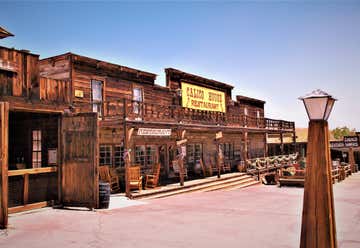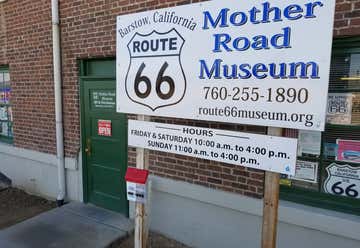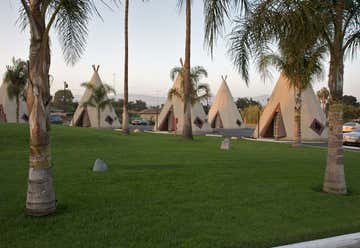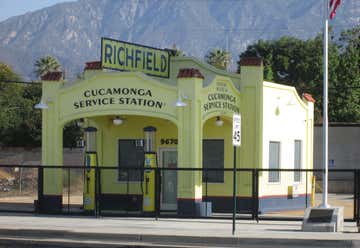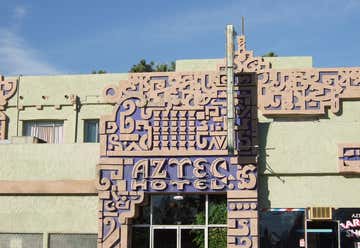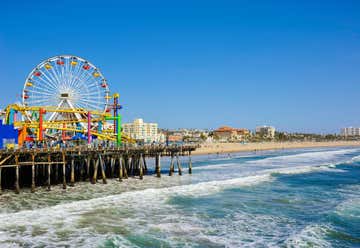This trip is brought to you by our friends at 76®!
California's portion of Route 66 might only be a few hundred miles long, but as the end of the line for the perennially popular Mother Road, it's loaded with old-school kitsch that makes it perfect for sightseeing roadtrippers. Delicious old-school diners, awesome retro architecture, inspiring folk art and historic gems line the route before it ends at the Santa Monica Pier, where the Pacific Ocean awaits... along with tons of amusements on the boardwalk. Here are some of the can't-miss sights on California's Route 66.
Before Route 66, railroads were the most common way to head west. In 1908, the El Garces Hotel was opened at the Atchison, Topeka, and Santa Fe Railroad depot in Needles. At the turn of the century, it was a luxurious hotel, restaurant, and train station, and its Greek Revival style was super sophisticated for such a small town train depot. It was fittingly named for the first European missionary to cross the Mojave, Father Francisco Garces. At first, as road travel became more popular, the El Garces lured in motorists in search of a place to enjoy a meal with linen and silverware, but by 1949, the restaurant and hotel were just too expensive for most road-weary travelers, and they closed. The railroad continued to operate out of the depot until the 1980s, and in 1999, the city of Needles bought the abandoned building. The El Garces Hotel might be a shadow of its former grand self, but it's under construction and will reopen again soon as a "Harvey House Hotel" (named for the man who ran the popular hotel and restaurant), complete with a Route 66 museum and shops. In the meantime, you can admire its unique architecture as it gets fixed up.
For that "middle of nowhere, USA" photo op, your best bet is Roy's in Amboy. Once a cafe, motel, and gas station, it now serves as a little souvenir shop and convenience store. The fact that it's quite out of the way is kind of beneficial, as people seem to love taking pictures of Roy's giant vintage sign surrounded by complete nothingness. Definitely take the chance to stock up on cold drinks and use the public bathroom during a stop at Roy's. The rest of the town is sort of abandoned, so if you're interested in creepy, modern-day ghost towns, take some time to explore.
The humble Bagdad Cafe in Newberry Springs might look like your average Route 66 roadhouse, but it's got a secret Hollywood past. It served as the inspiration and filming location for a 1988 comedy, also called "Bagdad Cafe," that was a bona fide cult hit in Europe, particularly France. Come in and grab a burger or a malt, and admire the decor while you wait. The walls and ceiling are covered in flags, letters, and pictures from international visitors, as well as Route 66 memorabilia.
Route 66 passes right by the famed Calico Ghost Town in Yermo. Calico was a Silver Rush town that flourished between 1881 and the 1890s, when silver prices plummeted. Today, it's a living ghost town, considering that it was purchased by Walter Knott in the 1950s and most of the old buildings were restored, replaced, or had gingerbread facades added. Some of the original buildings include the town office, the main museum (which was originally the town's post office and courthouse), Smitty's Gallery, and the general store. You can also visit the original cemetery. Other attractions have been added to the ghost town-themed park, making the experience super interactive. You can pan for gold, ride on the narrow gauge railroad, witness a re-enacted gunfight, visit the mystery shack, shop, eat, and even camp out.
What's a trip down California's Route 66 without a stop at a 50s-era diner? Peggy Sue's was originally built in 1954, and it was reopened in 1987 with an eye for preserving the vintage diner experience. Home-cooked food, 50s tunes on the jukebox, rooms crammed with pop culture artifacts, and a five-and-dime inspired souvenir shop make this a perfect atmosphere for a malt and a Buddy Holly Bacon Burger. The diner also has a sculpture park in back known as "Dinersaur Park," named for its giant metal dinos. Leave plenty of time to see all the sights at this stop.
For another dose of Route 66 history, check out Barstow's Route 66 'Mother Road' Museum. This hidden gem of a stop is chock full of info and artifacts that interpret the history of Route 66 and the Mojave Desert. You'll find compelling photography and history detailing the Route's rise from pioneer trails and railroad lines to its automotive heyday and present-day state. It's free to visit and run entirely by volunteers, who are eager to share their passion for the history of Route 66 with visitors. Plus, it's located in another historic Harvey House building (like the El Garces) and it has an awesome gift shop packed with classic Route 66 souvenirs.
Elmer's Bottle Tree Ranch is a unique Route 66 attraction, since it came to be well after the Mother Road's glory days, yet it still has the same fun spirit as classic stops. The Ranch is a veritable folk art wonderland created entirely by one man from found, upcycled objects. Elmer Long has been making vintage glass bottle "trees" for years now, and has more than 200 on the property, along with old gas pumps, cars, signs, bird feeders, and whatever other interesting objects struck his fancy. It's a whimsical little place, with plenty of photo ops across the property. If you're lucky, Elmer Long might be around to chat about his inspiration and offer a tour.
Route 66's Wigwam Villages are a prime example of the kind of roadside oddities that flourished along the Mother Road. While there were once seven across the US, only three remain. One is in Kentucky, and the other two are along Route 66, including the Wigwam Village #7 in Rialto. Instead of rooms, the Village rents out 19 30-foot-tall tepees. The reason they're called "wigwams" is because the original owner in the 1940s, Frank Redford, thought "wigwam" sounded better. Today, the wigwams in Rialto are super cozy, with AC, big beds, WiFi, and cable. There's also a spot where you can grill out, and an awesome pool area as well. It's one of the most iconic Route 66 gems, and it's thriving.
What sightseer doesn't love a gorgeous, weird, old bit of vintage architecture? The Cucamonga Service Station in Rancho Cucamonga is one such building. It was originally constructed in 1915, more than a decade before Route 66 was established. It then served as an oil service station. It was lovingly restored, and today the bright yellow beauty is a museum and gift shop, dedicated to the history of Rancho Cucamonga and Route 66. The city’s historic landmark is superb photo op, especially for a vintage car.
Another unique, vintage building is the Aztec Hotel in Monrovia. It was built with a distinctive Mayan/Aztec style in 1925 along what would soon become Route 66. There are few buildings left in the country featuring that unique design, so it's definitely a treasure. The Aztec was placed on the National Register of Historic Places in 1978, and underwent restoration in 2003. If you go inside, take note of the original tile floor, the dome-shaped windows, stained glass, and murals, along with the retro lighting fixtures, fireplace, and Mayan sculptures. It's a nice place to stay the night as well, with spacious and clean rooms.
Route 66 officially ends at the Santa Monica Pier on the Pacific Ocean. In fact, there's a sign at the very end of the pier that marks the end of the road. You'll technically have to hop out of your car and walk down the pier to snag the photo op, but it's worth it to enjoy the sound of the waves all around the ocean breeze. Plus, the Santa Monica Pier is one of the most retro-cool boardwalks in the country. There's an arcade, a rollercoaster, a Ferris wheel, a vintage carousel, fishing, restaurants, the beach, and lots of events. There's always something going on, and great people watching at the Pier. Grab a milkshake at Soda Jerks and soak it all in.
Whatever sights are your style, roadside kitsch, gorgeous architecture, ghost town parks, or beaches, California's short leg of Route 66 has them. It's all about keeping your eyes open and not being afraid to go a little off the beaten path to experience those unique wonders that make travel so worth the effort.



